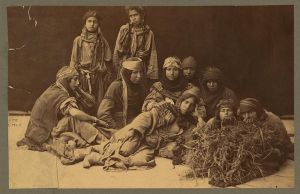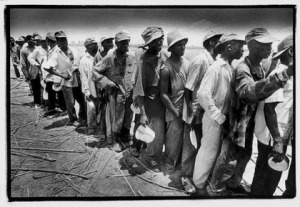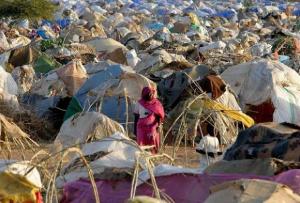If they were all together under one nation, they could populate a fairly big country, somewhere between Zimbabwe and Chile. They however are spread across the planet and cannot call any country “home”. We do not know their exact number, as they are undocumented and unrecognized – fallen between the cracks of conflict, geopolitics and discrimination. They are the stateless – no country recognizing them as citizens and thus devoid of the basic human rights derived from citizenship. In 1958, the UN branded citizenship as a human right, stating “Citizenship is man’s basic right for it is nothing less than the right to have rights.”1
Some of the most invisible people on the planet, there is somewhere between 12 and 15 million people who are stateless (depending on how the term is defined). The stateless are often times confused with refugees, the later might have some travel document and a particular country might claim his/her allegiance2. A stateless person on the other hand, is barred from healthcare, education, formal employment and a national identity.
The lack of any legal binding between such an individual and a state, results in the person not being able to own property, start a business, hold a driver’s license, open a bank account, etc. Worst still, he/she is unable to vote, thus lacking the power to elect representatives who can voice their concerns.
Statelessness aggravates poverty, creates social tension and in some cases, fuels wars. It is a self-perpetuating condition with children being born stateless as a result of their parents being stateless. Unrecognized by the state, they are denied government assistance and protection making them vulnerable to exploitation. Forced labor and slavery are common among such groups, as are other poverty-driven forms of human exploitation.
How people become stateless
So how does one become stateless? How does one lose the right to have basic rights? The reasons are myriad, but here are some of the leading ones:
- Redrawing of borders – when borders change, so does the identity of the ones who live on either side. Some however, like many after the dissolution of the USSR, are left without a state.
- Citizenship laws – Different countries have different sets of citizenship laws. Some grant citizenship by birth (jus soli), while others by descent (jus sanguinis). Depending on the laws of the country, the parents’ descent and the location of birth, a child may be born stateless.
- Arbitrary revocation of protection – Sometimes states intentionally snatch rights from a subset of its population. This is mainly due to cultural (Biharis) or religious (Rohingyas) differences.
- Discrimination against women – Many countries have citizenship laws that discriminate against women. Women in these countries cannot claim citizenship for their children. UNHCR claims that there are over 30 countries with such laws.
Aside from these reasons, there are millions around the world who lack proper documentation to prove and claim citizenship. However, lack of identity documents is less of an issue in underdeveloped countries, where birth certificates, social security numbers, ID cards, etc. are pretty much nonexistent.
Who are the stateless?
The following are some stateless groups around the world. This list is by no means complete and it is not a ranking of any sorts. There are countless other such groups who share the same fate.
- Rohingyas (Myanmar, Bangladesh) – The Rohingyas are a Muslim minority group of the northern Rakhine state of Myanmar. They have been subjected to systematic discrimination by the ruling military junta and in the 1990s, nearly a quarter of a million fled to neighboring Bangladesh. In Bangladesh, the Rohingyas live as illegal immigrants in abject shanty towns. Many have migrated to Malaysia and Thailand, where they can earn money to be sent to their families.
- Palestinians – Easily the largest stateless community, the lives of four generations of Palestinians have been shaped by a lack of national identity. Living in a disputed and geopolitically charged zone, many have moved to neighboring Arab countries, where they continue to lead a stateless life.
- Bedouins (Middle East) – The nomadic Bedouin (“without” in Arabic) tribes have roamed across the Middle East for centuries. After the division of the land into what are now Kuwait, Saudi Arabia, Syria, Jordan and Iraq, many countries used tribal affiliations to determine citizenship, leaving hundreds of thousands stateless. Today, the Bedouins are concentrated mostly in Kuwait.
- Roma (former Soviet Union, Yugoslavia and Czechoslovakia) – The Roma belong to the ethnic Romani people (Gypsies) living in Eastern Europe and the Balkans. Many European governments do not allow these gypsies the same rights as their other citizens. Thousands of Roma in Europe were left stranded without a state to call home, when Yugoslavia and Czechoslovakia broke up. Decades of conflict in the region, has made the Roma an easy target to ethnic violence.
- Black Mauritanians (Mauritania) – In 1989, Mauritania’s Arab-dominated government revoked the citizenship of an estimated 75,000 black Mauritanians.3 Most were then forced to flee to neighboring Senegal and Mali, where they continue to live as stateless. Since then, there has been a slow trickling of black Mauritanians back to their homeland, only to be treated as second-class citizens.
- Dominicans of Haitian descent (Dominican Republic, Haiti) – Haiti and the Dominican Republic share the same island (Hispaniola) and have a long history of cross migration. Yet, the Dominican government systematically refuses to issue passports or other proofs of citizenship to people of Haitian descent. The government’s claim: it is merely trying to “clean up” its civil registry rolls3.
- Hill tribes (worldwide) – Millions of tribal people living in mountainous regions worldwide, are denied a true national identity and state privileges. Governments in Thailand, India, Bangladesh and many other Asian countries, do not recognize these indigenous tribes as citizens and have led “campaigns” to integrate them to mainstream culture.
The State of the Stateless today
Statelessness has been historically overlooked by people, governments, aid agencies and also the UN. You hardly ever hear about the almost 15 million stateless on the news, or find scholarly papers at the library or the internet. In 1961, the UN organized a Convention on the Reduction of Statelessness, although to date, only 34 countries have signed this. One UN agency, the UNHCR has recently launched a campaign to highlight the global statelessness problem. One thing this campaign achieves to do is to clearly define the term statelessness, so that the true scale of the problem becomes clear.
There have been some notable successes in alleviating the problem. In 2009, the Bangladeshi High Court ruled that Biharis (who sided with Pakistan during the 1971 independence war) born in Bangladesh after 1971 would be granted Bangladeshi citizenship. Several North African countries, including Egypt and Morocco now permit women to pass their citizenship onto their children. After 25 years of gruesome civil war where millions have been victims to ethnic cleansing, Tamils can now obtain nationality in Sri Lanka.
One hopes that this UN campaign and the positive actions taken by governments across the world will bring this issue to limelight and grant the basic human right of statehood to those who don’t have it today. The world needs a coordinated effort in recognizing those around us who are not recognized by any states. Statelessness is an issue whose time has come.








